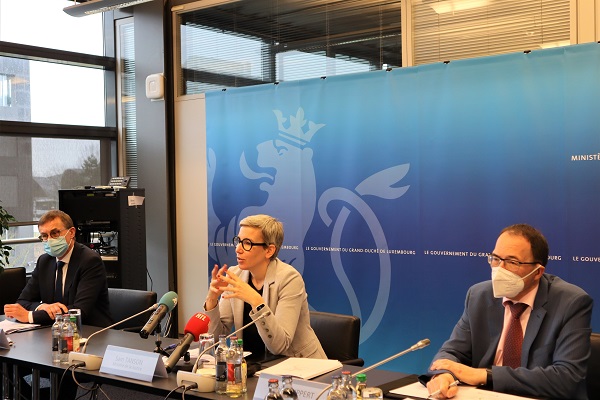 L-R: Yves Gonner, Director of LBR; Sam Tanson, Luxembourg's Minister of Justice; Daniel Ruppert, Director of Commercial Law Directorate at Ministry of Justice;
Credit: MJUST
L-R: Yves Gonner, Director of LBR; Sam Tanson, Luxembourg's Minister of Justice; Daniel Ruppert, Director of Commercial Law Directorate at Ministry of Justice;
Credit: MJUST
On Monday 21 February 2022, Luxembourg's Minister of Justice, Sam Tanson, presented the reform of Luxembourg Business Registers (LBR).
LBR is an economic interest group under the aegis of the Ministry of Justice which manages the Luxembourg Trade and Companies Register (Registre de commerce et des sociétés - RCS), the electronic compendium of companies and associations (Recueil électronique des sociétés et associations - RESA) and the Register of Beneficial Owners (Registre des bénéficiaires effectifs - RBE).
Taking place between 2021 and 2023, this reform includes the introduction of administrative sanctions, the aim of which is to improve the quality, reliability and rapid updating of the information available in the RCS and RBE registers, as well as the establishment of a more user-friendly website for the general public and IT services facilitating access to information for professionals and administrations.
Following an in-depth review of LBR's strategy and international benchmarking carried out in 2020, four major objectives were determined:
- to provide accurate, complete, up-to-date and correct information;
- to ensure optimal use of data and maximise the usefulness of registers for the Luxembourg economy;
- to ensure compliance with legal requirements in order to guarantee professionals and administrations reliable data;
- to support and guide users to ensure a seamless user experience.
Historically, commercial registers were intended to collect information and documents from registered entities, but, according to the Ministry of Justice, the evolution of the market and international standards has given them a more proactive role in the commercial environment and risk mitigation. At the national level, this has led to a considerable increase in data access requests from national authorities.
For all these reasons, noted the ministry, LBR must now adapt its missions to the many national and even international requirements and strengthen its role as a centre of expertise.
LBR's transformation will be built around three key initiatives and will be implemented by the end of 2023: put in place the necessary adjustments to the legal framework, in particular by introducing powers of sanction; establish the target operating model and define the required processes; invest in technology (e.g. digitalisation of forms, a secure platform, etc.), increase capacity (doubling the workforce between 2021 and 2023) and optimise know-how (quality of support) to reach the new operational state of LBR.
Minister Tanson and the Director of LBR, Yves Gonner, also presented the new electronic platform. Alongside the website, this IT tool enables secure exchanges of information between the manager and its users, with a view to accelerated, automated and continuous communication. The platform has a double advantage: it allows users to access a large volume of information automatically and quickly and it further digitalises the services offered with a view to administrative simplification and user-friendliness.
Finally, this tool allows consultation of the RCS and RBE, both for administrations and for national and international professional audiences. During the 2021 financial year, nearly 20 million documents were consulted and downloaded from the LBR website.








